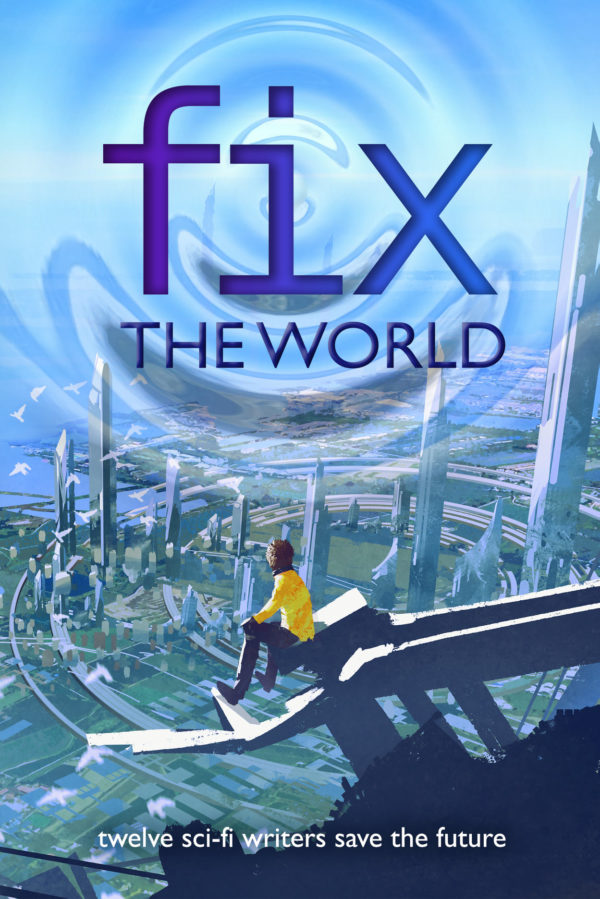I’m relaunching The Weekly Fix, with a twist. For now, instead of a serial tale or a short story, I’m sharing excerpts from the stories in the forthcoming Fix the World anthology. This is a fantastic collection of twelve hopeful stories from sci-fi writers on how to fix some of the greatest problems we face as a world.
This is the last story from the book.

The Homestead at the Beginning of the World
Jana Denardo
Sam surveyed the glacial lake, blooming green under September’s sun. Some days, he couldn’t believe all of this was his. The Ojibwe had remained stubbornly rooted in their homeland when so many others had been ousted back in the original days of the European colonials and his family had owned this sizeable homestead for generations. He felt honored to be its current custodian.
A century ago, the entire world learned what the Indigenous people had felt all those centuries before: First contact. It certainly hadn’t been as happy as Star Trek would have posited, but the fact, like Shakespeare, that the show had remained in the cultural zeitgeist nearly two hundred years later said something for it. Too bad it hadn’t been accurate where first contact was concerned.
For Sam, its message of hope might even be embraced tighter now that the alien invaders were gone though no one was entirely sure why. Certainly, the human freedom fighters tried to destroy them but had been woefully outgunned. As far as anyone could tell, the aliens, the Derjviks, had destroyed themselves, and Earth had only been a hunk of rock caught between warring factions. For the last one hundred years all the planet had been nothing more than a source of resources, and its people lab rats.
Now the Derjviks were gone, and humanity was creeping forward. Sam couldn’t complain about his patch of land, some hundred acres in what northern Wisconsin had been. Now it was part of the Ojibwe Nation allied with what was left of Canada and America. He could live here without being overly bothered by either country with one big exception, what he farmed on the multiple little lakes that dotted his land. In the marshes he grew cranberries and blueberries. Some of his lakes had the wild rice and fish that had been his people’s cultural foods for thousands of years but that’s not what would bring the weekly visitor to his door.
Speaking of which, Dr. James was late. Maybe she was waiting at his home, but that would be unlike Linda. Leaving the lake behind, he sauntered back to the main compound. His own home was modest, and he owned several cabins along with his mother. Now that humanity had picked itself up a bit people had begun to travel. Who wouldn’t want to come someplace as beautiful as this? It had been less ravaged over the last several decades than the major cities had been. The people here hadn’t been herded into internment camps as slaves. There hadn’t been enough humans in this area to bother with.
Still, as he wound his way along the hemlock and pine shaded pathway, evidence of the Derjvik invaders could be found pock marking the area. He skirted past a metal hunk of what had been a ship. Eventually, he’d have all the wreckage hauled off his land. There was a foundry not too far away reclaiming the metals. God knew there was enough of it to recycle into dozens of vehicles, tractors and whatever else they needed.
At the moment, most of his cabins stood empty other than the smallest of them, which housed a grandfather and his teenaged grandson who wanted to show the old man something peaceful and green. The man had spent his early life as one of the lab rats. Sam was shocked he’d hung on this long. So many died, they might never know the true number. Obsidian, one of his dogs, mostly retriever, jogged out from behind one of the cabins barking, not at him but rather at someone coming up the road. A motorcycle, old but kitted out for biofuels, sailed up the road more gracefully than Sam expected. It was as if the rider had some sixth sense about where the road needed grading. Dr. James knew, of course, but whoever this was, he was easily a foot taller than she was. He assumed that it was a man but who knew. The Derjviks had experimented with making humans bigger, stronger, less reliant on food and a whole host of other things. Linda and her scientist friends had said that in some areas of the world there wasn’t a single purely human DNA strand to be found.
The man parked his bike and took off his helmet. Pale, nearly white hair framed his strong jaw. His skin was pale too but tinged with green. Someone in his family – maybe even him – had been spliced with chlorophyll, an aborted experiment in making them into autotrophs. Maybe the Derjvik had wanted to perfect the genetic engineering for their own people. There was a certain advantage in being able to manufacture food from light.
“Hello,” Sam called, grazing his fingers over his pocket. His pistol nestled in there. He might not like weapons. But as much as he hoped fighting the Derjvik would brought humanity together—and overall it had—there were still marauders and people who wanted to take anything they could.
The man swung off his bike and made Sam tense when he put a hand in his pocket. He pulled out a wallet, flipping it open to show his ID. “Dr. James broke her leg. I’m her replacement.”
